#diegesis you love him so much
Explore tagged Tumblr posts
Text

first tumblr post and its me going crazy over npf who couldve guessed
#nonplatonic forms#diegesis#liam lee#i love this game dearly#diegesis you love him so much#i crode#idk if this is how posting here works but oh well
41 notes
·
View notes
Text
I am so utterly fascinated by “Saki”, the 18-year-running mahjong manga in which you, the reader, become gradually, frog-boilingly aware (over the course of nearly two decades’ worth of mahjong tournaments) that none of these girls are wearing underwear and most of their boobs are slowly expanding.
I need you to understand that I have, like, an anthropological level fascination with this comic. From the perspective of someone who is also a comic artist and writer, two things delight me about it:
the fact that I understand completely how an artist gets from “the fans can have a little hint of skirted asscheek” to “the pussy is completely out on center page” over the course of 18 years; and
the way in which the pussy being out is treated by the characters and diegesis as being utterly unremarkable.
Okay. Point 1. The frog-boiling.
Let me put this in perspective for you. There was already a meme about how the characters in “Saki” don’t wear underwear when I was in middle school. I am thirty now. Okay? And it’s still going.
In the time since, this has stopped being a joke. It is now indisputable canon. This is not because anyone outright says it at any point. It’s because the underwear ran out of places to hide. I’m obsessed with this thought: somewhere in the over 20 volumes of “Saki”, there is a panel in which underwear was objectively deconfirmed. And it would be so hard to figure out where that panel actually is. Maybe the artist didn’t even realize it when she drew it! The frog? Boiling!!
And of course there is also the breast expansion. I don’t know how to put a spin on this. They are just expanding. Like, this happens a lot with artists: you define a character as being, in your mind, “the one with the big boobs”, and over the years you emphasize that trait further and further so that the signal doesn’t get lost in the noise. It’s just that normally—in like a wildly popular manga series about mahjong published by literally Square Enix, for example—normally there would be a point at which the boobs stopped getting bigger. Like, an editor would step in or something. Or you would get to the point where you cannot draw the character in the same panel as her mahjong tiles without her breasts spilling over the tiles, and you’d go, “Well, this is now untenable.”
That did not happen. There is no ceiling. The frog is soup.
Point 2. The complete and utter mundanity of all of this.
It’s like this, okay: there’s no shortage of trashy ecchi manga out there. There’s a million other comics doing wildly bawdier things with wildly more improbable bishoujos.
The vibe with “Saki” is different.
It’s hard to explain this, but it feels like the world of the comic is fundamentally uninterested in the fanservice happening on the page. I cannot describe it as “leering”, because I cannot conceive of a person in the story from whose point of view one would leer. I think the artist is probably into it—I can’t imagine anyone is making her do this—but “Saki” the comic has no opinion on the matter.
There are essentially no male characters in “Saki”. Like, there was one guy? Kind of? At the very beginning? But he is gone now. They put him back in the toybox. He does not exist. It appears to be some level of canonical that in the world of “Saki”, almost all humans are women. Those women are sometimes romantically into each other. According to comments the artist has made on Twitter (which I cannot source), they have lesbian baby technology, so it’s no problem. It’s so much not a problem that the story is about mahjong, instead of any of that.
So, like, the fiction here appears to be this: this is the, like, meta-narrative of the fanservice of “Saki”, right: it’s just normal that they don’t wear underwear and their boobs are arbitrarily big. It’s been normal. It was normal before the story of the manga began. It’s just how things are. Nobody bats an eye about it, and if they do, it’s in sort of a lesbian kind of way so like what’s the problem, we love lesbians here. This is literally normal for girls.
The fanservice simply diffuses into this all-encompassing aura of disembodied, ambient sluttiness. The framing of the panels demands you acknowledge it, and the story demands you already be over it, because it’s mahjong time now, and we’re playing mahjong.
Do you get??? why I’m so fascinated??? Are you not a little enraptured???
Anyway, I have no idea how to end this weird post. I guess the conclusion is that women stay winning????
45K notes
·
View notes
Note
Their was no death,
And yet his arms warped around sakura just a bit tighter as he kissed their shoulder. Gentle fingers played with sakura's hair as he did his bet to drown out the screams that seemed to echo in his ears.
he made sure of it
" Lets just stay on bed today"
My muse is dead. Tell me how yours is dealing with it. @diegesis-x-dolonia
A soft sigh and a smile. "Hmmm... " So warm.. so comforting... Dante made Sakura smile, not able to move with the way the other had such a tight hold on him. He loved it. He seemed to hold Sakura together... not for the first time, he felt as if he would fall apart without the other near him.
"...we'll be in trouble," he warned softly.... "...okay."
#diegesis-x-dolonia#I LOVE HIM SO MUCH DAMMIT#Durante#Dante really said 'Sakura?? Dead?? *john cena face* ARE YOU SURE ABOUT THAT??'
2 notes
·
View notes
Note
Congratulations on 600, my pretty wifey! I am here with four fics I love cause a bitch be indecisive. May I please have a Bottle of Diegesis in gold with a scarlet potion? (For Kuroo, if character is needed).
I'm a total home body so my preferred dates would consist of ordering take out or cooking (rarely) and curling up on the couch with a new movie or TV show. Or we'd go to a movie in the park or cemetery or rooftop if we decide to go out. I like dates that don't require a lot of walking because ankle pain is a bitch. Lol so very simple and chill and low key dates.
Fic recs:
1. Suna, sfw
2. Kuroo, sfw, cw: pregnancy, vague
3. Suna, nsfw + sfw, long fic
4. Touya, nsfw + sfw, long fic
Oh Onyx, how blessed I am to not only have your support but to be able to call you a close companion and a wife. I truly cannot thank you enough for all you have done for me - I wish you nothing but kindness to match your kind heart. 💛
Now please, sit and get comfortable. I have a very special brew just for you.🔮

“Tetsurou! Stop it!” you giggled, squirming away from his as your hands tried to block his away from your sides - your skin getting goosebumps over the ticklish sensation brought upon you.
“Stop what? Trying to give you my love?” Kuroo shot back, you could practically hear the pout in his voice “That’s so cruel babe, how could you?”
“Yeah, well you’re making me miss the important parts!” You whined, already moving his hands away from your sides once more; shoulders hugging your ears to preemptively stop him from attacking there as well.
“But I missed you~”
And it was true. He had been gone for two whole weeks to help promote Team Japan across the country, and in press releases, before the championships were about to begin. He was swamped and very much away from you, one of the few things that brought him comfort in times of stress. And, of course, you missed him; he was your favourite person this side of the country. So when he finally came home it was mutually decided that the pair of you would do nothing but cuddle up all weekend.
You had even gathered a bunch of new movies you had both been dying to watch over the past few months; and even held back on watching your new favourtie show so that you could catch up and experience it with him.
But it was clear he had other plans; and though you would normally indulge him, you had been waiting just as long to get a resolution to a cliffhanger that had been bothering you for weeks.
“I know,” you sighed, already leaning back into his warmth - wandering hands be damned - “But I’ve been waiting to see what happens for forever now! Can’t you just hold off for a few more minutes?”
Your breath hitched in your throat as you felt his lips start to trail up your neck, hands pulling your hips to flush your backside against his aching, twitching, cock before one slipped between your thighs, teasingly running up and down your panties before circling your clothes clit.
“You think I wanna wait?” You could feel his smirk as he nibbled on your pulse point “We can always rewatch the episode baby, so come on, lay back and lemme take care of you, yeah?”

A potion for a potion, I hope this pleases you 🔮
#if my brain wasn't so dumb I would have gone further#but alas I hope this will do#my darling sweet Onyx#thanks for always being there and for always supporting me!#you're a great friend and wifey 💛#🔮.the peddler answers#🔮.fellow witch onyx#🔮.a peculiar 600 follower event#kuroo x reader
14 notes
·
View notes
Note
What is your overall opinion on the Harry Potter book series? TBH I feel like the series was random and unnecessary cruel at times, Snape was a better written part of the series, probably because he was based of a real person
I understand what you mean by random. It was originally conceived as generic children media, in fact reminds me a lot of 90s made-to-television movies, like 1998 Madeline, or 1996 Clubhouse detectives, none of them supposed to be taken too seriously, so neither author or editors concerned with creating a diegesis that actually made sense, what for?
It was only later that they decided to try and sell it as a more serious saga, but the tone was already set and several details just didn't add up. It's clear that little historical research was made and the series has quite a few anachronisms.
I totally agree it was unnecessarily cruel often times. Plot-wise, and character development-wise, is very lazy that Harry has to stay with the Dursleys and that they never get better. I suspect that Rowling thought it had to be that way because in classics like Matilda or A little princess, the kids don't get away from their abusive environments until the very end, and I mean, the Dursleys are just a Wormwoods ripoff.
The house elves! 😡 Slavery apologism! I always hated it. People have acused me of making that up, that "of course I didn't care that much as a kid". I did. I don't know what kind of children these people were, but I actually was taught that slavery was evil. I also didn't like pokemon by the way, with pokemon existing just to serve humans and them unremorsefully having them get hurt. I prefered digimon frontier, with the kids transforming and battling by themselves, thank you very much.
Hagrid attacking Dudley to punish Vernon, Harry's violent attack to Malfoy in Prisoner of azkaban, Harry constantly ditching Neville and literally being embarrassed to even be seen around him (thought of course that is regular teenage behavior), "Moody" abusing Malfoy... It's as if being one of the good guys™ grantes you right to be nasty and it was magically funny when bad guys™ were tretaed unjustly. Unjustly, I reiterate because I don't oppose Malfoy, Dudley or Vernon getting consequences for what they did, but random low blows isn't that. I would feel different if it had been sone isolated incident, but it's actually a pattern.
Dumbledore's clear favoritism to Gryffindor/"subtle" despise for the other houses (especially slytherin). Dumbledore going from affectionate to completely withdrowing, leaving Harry needy, confused and thinkig he had done something, was emotional abuse. I personally think he might have been similar with Hagrid, who admires him in a way I find borderline unhealthy. Quite the father figure, Dumbledore.
Having said that (and I honestly have more to say about it) I fell in love with the series when I was little and it was HUGE part of my life and my family. I don't know if I'll ever outgrow it, even as I find more and more details that irk me 🤷🏻♀️
Snape is in fact my favorite characater (and was so since Philisopher's stone). More than being based on actual person -after all, all characters must have some thing or abither from real people and even Rowling herself, as much as we fight it, we really can't create from nothing; every mask is a self portrait, and I think every writing has the author's desires, fears and memories weved in the characters, settings and themes, even if the author is not aware.-- the reason I think Snape is well written is that he wasn't created neither a good guy™ nor a bad guy™, so with him more than anyone else did jkr allowed herself to create a human . She possibly didn't even get there on purpose! I've read that Tolstoi started Anna Karenina intending to mock feminist ideas, but inadvertly got himself convinced by his own character's arguments, when he had created her what he believed to be stubborn and clueless of the real world. By not trying to make Snape perfect and not trying to make him perfectly evil, she managed to dive in a complex story that she maybe didn't plan, of a victim of abuse released to the world, eager to go from abused to abuser, but who ultimately got to know the better parts of humanity, like friendship and compassion.
#use of emojis#jk rowling#harry potter#forgive typos my eyes are itchy I should be sleeping now#severus snape#dumbledore#hagrid#dursleys#matilda#madeline#snape#anon#ask
5 notes
·
View notes
Note
In the spirit of obsessing even more over Mine, I can’t help but parallel the parent/father lyrics in the song with what Santana sings in At The Ballet. Yes, I am absolutely reading too much into it, and am certain Glee probably did this by accident, but that’s two songs now where Santana paints a not-so-nice picture of her father in song. Then on top of that, we have:
Santana mentioning during Lights Out that her being a tomboy as a kid really pissed her Dad off.
The general impression that he’s an absent Father, given Santana seems to have spent a lot of time with her Abuela growing up.
The Pezberry bathroom scene in 5x13 where Rachel offers Santana the lead in 10 FG shows as a peace offering. She says something like “your Mom can come, or your Abuela.” Why not “your parents?” Rachel lived with Santana for months. Does she know something we don’t?
His absence from the wedding (definitely a casting issue, but also technically canon, so…)
I’m adding two and two together and coming up with twenty eight here, but that’s pretty much what all of us do when it comes to Glee, so I don’t care. The pieces kind of fit together to indicate quite a rocky childhood for Santana, and her Dad maybe being the cause of a lot of that? He clearly accepted her sexuality when she came out though, so I don’t think he was evil or anything. Just maybe a little careless, (to borrow from Taylor lol)?
Honestly, this isn’t even an ask I just ended up rambling haha. But if you have any thoughts on how Mine might relate to Santana’s family life at all (which I suspect you do), I’d enjoy reading them, as always.
Tumblr just deleted half my answer which... this hellsite underestimates my willingness to go on and on about Santana Lopez, I shall not be stopped. So here we go again!
Mr/Dr Lopez is an interesting case because Glee never cared to actually give him anything but there's much to speculate. I think, we had to choose, I'd read more in At the Ballet just on the basis of diegesis but at the same time there isn't a single second in the Mine scene I'm not obsessed with so of course we can also take that into consideration.
There's no reason we couldn't put two and two together and come up with twenty eight. Based on what canon gives us, Santana's relationship with her dad could easily be quite strained and distant. I think his absence from the wedding is something I can't quite, like, take at face value, just because his only(? lmao) daughter's wedding is such a huge thing to miss when even his homophobic mother was there and he's supposedly cool with the lesbian daughter thing. So I think just for me personally I'll elect to ignore the fact that he was nowhere to be seen the same way that I don't accept the absence of Quinn. We could make it work logically but every variation makes me sad lol.
When it comes to Mine, there are two bits that are relevant here: “careless man’s careful daughter”, of course, and this:
You learn my secrets and you figure out why I'm guarded You say we'll never make my parents' mistakes
I love this first line from a Brittana perspective (and the way Naya sings it, forever sobbing) but Brittana aside, “parents’ mistakes” implies a lot here. If we put it into the context of the implied cheating in At the Ballet and what Santana says right after singing Mine, there’s a case to be made here. Based on everything, it’s not wild to assume Dr. Lopez cheated on Maribel and they might still be married and technically together because that’s how they roll but not actually a couple anymore. I think Santana’s breakup speech substantiates that, what with her letting Brittany go only to prevent an even bigger heartbreak “when someone eventually cheats” - telling words here. And yes, we can also contextualize this within the episode because she’s talking about long-distance relationships here and possibly talking about the other two breakups but the Mine and At the Ballet lyrics both support this.

Not to turn this into a “Santana’s complicated relationship with the concept of cheating” post (which I’ll inevitably write anyway as soon as someone reminds me to) but her mature decision in Mine could easily be interpreted as a lesson she learned from her parents’ mistakes. So she breaks both her and Brittany’s hearts now in order to protect themselves from an even bigger potential pain in the future, perhaps one she experienced as a kid when Dr. Lopez cheated. Honestly this would just add yet another layer to the Mine scene which I already adore every second of. It fits with careless man’s careful daughter, too, because like you say maybe Dr. Lopez isn’t evil or anything but careless with how his actions affected his family and so Santana grew to become careful in the sense that she keeps her heart guarded. And affected her own attitudes towards cheating but, another post. I’ve also read interpretations where Mine is a narrative switcharoo and it’s actually referring to Brittany and Pierce, him being the careless man. But that’s just a btw and a whole other interpretation.
So the thing is, I fully went into this post wanting to say that there is a reading of Mine (and everything else) where Dr. Lopez cheated but stating that I personally choose not to look at it that way. But then I wrote all this down twice so now I’m like, maybe I convinced myself? Him being sorta distant but also trying and not actually a bad guy has always been reading of Dr. Lopez and even in the At the Ballet post I said that the cheating could just be an emotional truth rather than what actually happened. But now that you made me think about Mine I’m gonna run with yeah, he probably had an affair or two and it caused him to have a strained relationship with both Maribel and, inevitably, Santana. But I still maintain that in her young adult years/twenties they reconnect and find a way to make their dynamic work because Dr. Lopez might be a careless man in some ways but, and this really is just a HC, I think he’d learn to make an effort with his daughter. They stay together with Maribel and he as well as Alma do a lot of growing.
The main reason I believe he was fundamentally trying with Santana and would make an effort is because of, all things, IKAG (derogatory) and that one line about both of Santana’s parents being okay with her sexuality. It’s not much but after the implications of him having disliked her tomboy phase, I think it implies that he does actually accept her but has his own growing to do. But maybe that’s just me not wanting Santana to have much more baggage than she already does.
#like any self-respecting lesbian#santana has a complicated relationship with her father#that's a joke don't @ me peeps#mine gcv#continues to be THAT bitch#santana asks#lopez family#dr lopez#glee asks#amazonworrier#santanalysis
10 notes
·
View notes
Text
Shitty Luca Movie Recap, Episode 4
Can’t Watch Nina, Even For Luca?
Don’t Worry, Me Neither. Goodbye.
.
..
...
Ok, fine, I’ll talk about the damn thing.
So it’s a warm September night, and I’m in the mood for a Luca Marinelli feature. In my infinite wisdom I choose Nina. “It’s directed by a woman,” I reason, “and women know what’s up.” ‘What’s up’ in this particular case is code for ‘how to frame beautiful men for the female gaze’. Because women can be auteurs, too, and being an auteur means making movies about your own personal wank material.
Turns out, sometimes a woman’s wank material consists less of a gorgeous male form and more of fascist architecture. We’ll discuss the former in due time, but for now, what’s Nina even about? Well, at its core it’s a simple story about a young woman who doesn’t know what she wants, set against the backdrop of the Rome that is almost entirely empty due to most people leaving for the summer. This could have been a fairly straightforward coming-of-age film, but Nina is too indie and up its own ass for that. Literally nothing of note happens in this movie, and it’s all long static wide shots of empty streets, endless stairs, and domineering largeness of Rome’s most famous fascist buildings such as the Palace of Italian Civilization, the Sapienza University of Rome, Palazzo dei Congressi, and, most prominently, the Fountains Hall. (Google what they look like if you don’t know.) Now, I’m guessing those locations weren’t chosen by accident. They could have easily added to the creepiness of the movie — and I’m assuming creepiness was intended; otherwise how do you explain these hoverboarding nuns?

Anyway, the employment of the locations could have been atmospheric and thematic had the shots not been so bland. But they are. Bland, flat, and always looking the same no matter what is happening in the scene. Usually audiences are willing to sit through slow uneventful movies because of interesting visuals or characters worthy of attention, but Nina has neither. The titular character herself is tedious. Even her bad fashion sense is bad in a boring way that doesn’t tell you anything about her. Is she stuck in perpetual adolescence? Is she searching to get in touch with her sensuality? Who knows. The only thing I’m certain of is that she needs to learn to tuck her tops into her bottoms.
Nina spends her days giving singing lessons, going to Chinese calligraphy classes, eating cake, exercising and taking midnight walks in the empty city. She wants to go to China in September — it’s the closest thing to a goal she has — yet she’s done no preparations, and instead of learning Mandarin she’s studying calligraphy. And she’s real bad at it, too.
There are reoccurring visual elements in the movie besides the vast emptiness: stairs, white columns, a jogger, a red dress, animals… You’d think those were very straightforward symbols, but they’re used too sporadically and inconsistently to hold any meaning. For example, animals. Nina is tasked with both helping out in a pet store and house-sitting an apartment with a German shepherd (a good boy named Homer), a guinea pig and a tank full of fish. The instructions she’s given are absurd, like feeding the dog sleeping pills and putting the guinea pig on a diet. And then there’s a supposedly American TV show always playing in and out of diegesis about dogs living in cages and swimming happily in pools, and it looks and sounds like a video off the political section on the dog version of YouTube. It contains timeless classics like “You are a dog born in the age of consumerism” and “Depression is an evil illness now spreading amongst dogs of every breed, dogs belonging to every social class.” The butter commercial from Crazy Ex-Girlfriend could never. And I wish the whole movie was as surreal as this TV program but unfortunately it’s as bland and directionless as Nina herself.
And boy is it directionless. There aren’t any subplots in the movie, no cause and effect, no acts, no structure, no flow; only scenes that happen, and I can’t even find any reasons for the order in which they happen. The scenes also don’t start or end; they just interrupt each other, not leaving any emotional impact. For example, there’s a scene where Nina sees her future self. She’s on one of those midnight walks with the good boy Homer when she sees a couple being romantic. The woman is wearing a long red dress, and the man is in all black. The shot is wide, so it’s impossible to see their faces, but the woman is obviously Nina:

And the man is definitely Luca. I recognized his ass. I’m not joking, guys. It’s his ass:
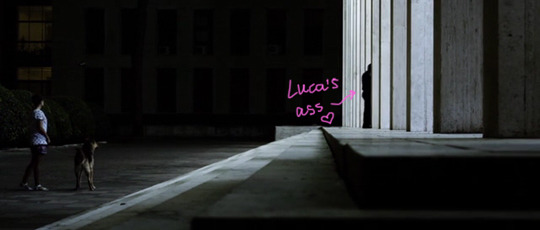
Also I was later directed to the website of the photographer who took the set photos, and yes, it’s Nina and Luca.
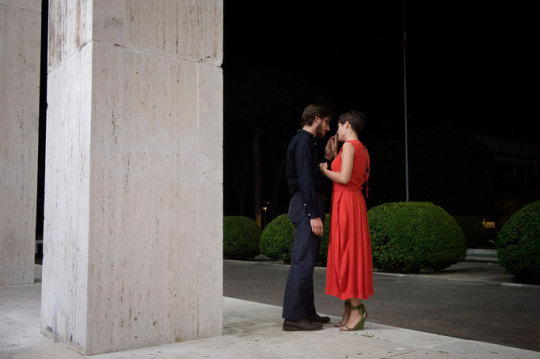
I never forget an ass.
Anyway, Nina, who at this point hasn’t properly met Luca’s character, Fabrizio, sees herself from the future acting romantic with him, and doesn’t react. We don’t even know if she recognizes herself or him or whether it’s even a real scene or a dream. How are we supposed to empathize with a heroine who isn’t allowed to react to her environment?
Whatever, it’s time to talk about Fabrizio. He plays the cello and he’s obnoxious. That’s it. He first appears as a patron of Caffé Palombini, the real-world café Nina frequents (and buys her cakes at). She’s drinking her usual milk shake and reading. At some point, their eyes meet, but neither says anything, and then Nina gets up and runs after the good boy Homer who decided to take a little stroll by himself. She leaves all her things behind: her milk shake, her handbag, at least three books, a whole stack of paper for calligraphy, and her diary. It’s obvious she’s going to come back as soon as she gets the dog. And yet before her feet are even out of frame, Fabrizio gets up, goes to her table and fucking steals her diary!
His next several appearances are random and sporadic, and it looks like he’s stalking Nina, but by the time of his first actual scene she is following him for some reason. Obviously, he can’t let a woman outcreep him, so he ambushes her:
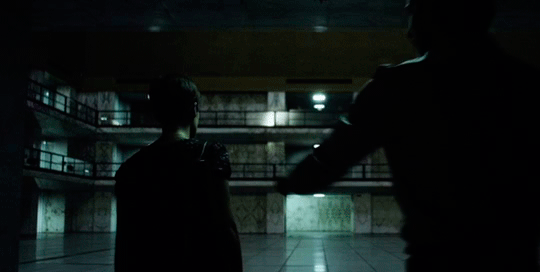
He tells her blankly, “You’re following me,” but I think this scene deserves better dialogue. Thankfully, we have a whole well of predator/maiden media to pull from.
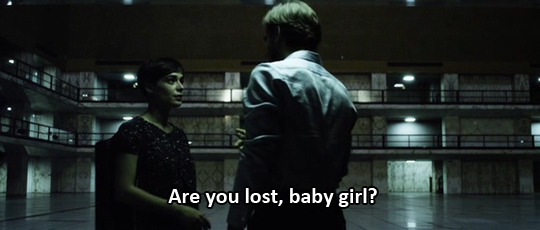
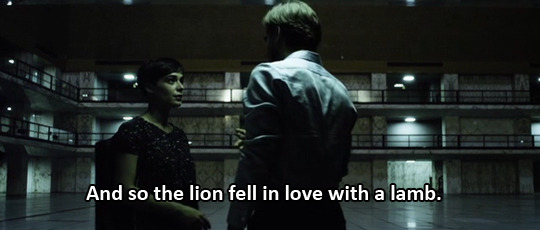
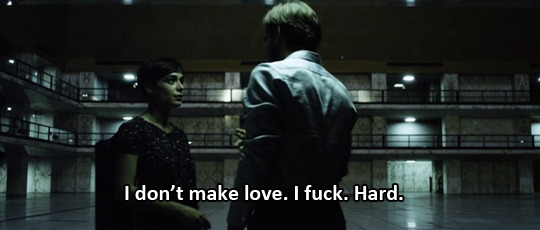
Though I personally believe this is the most appropriate line:
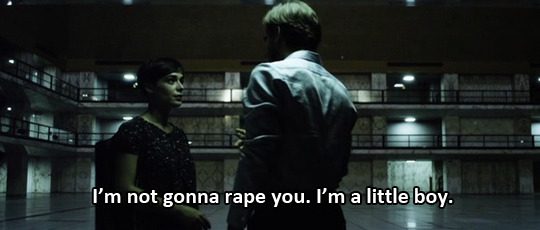
Fabrizio lets Nina know he has her diary in the dickiest way possible: he quotes from it to let her know that he’s read it. He then informs her that he’ll only give it back to her if she continues following him. And it’s not blackmail; “it’s an agreement.” What an asshole! I’m weeping for the dignified cuckoldry of Joseph.
And what was the purpose of that “agreement” plot point if the next time they meet is by chance? Quirky love interest writing, duh. So quirky that the accidental meeting happens when Nina is walking past a phone booth where Fabrizio is… doing a phone prank? I don’t know, I got nothing. Anyway, he’s annoyed their meeting is unintentional on Nina’s part, but he returns her diary, and I guess they start dating? He watches her sing once with what could only be described as a complete absence of emotions:
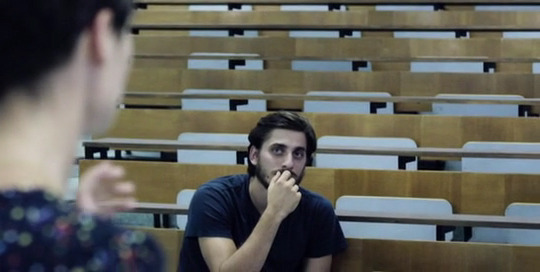
In the next scene she watches him play the cello after which they go on a date. Nina is wearing the red dress from the vision, but Fabrizio’s shirt is different. I fucking give up.
Their next (second?) date is a romantic dinner on Nina’s roof, and they’re dancing for entirely too long. She then tells him she’s scared of how much she’s enjoying his company, gives him a ridiculously chaste kiss goodnight and… completely ghosts him afterwards. And if you didn’t dislike Fabrizio before, you will now as he starts calling Nina at ungodly hours (including 5:30 am) and leaving her very whiny and increasingly more passive-aggressive, entitled, and accusatory voicemails. At some point he even leaves a voicemail for the fucking dog! He’s like, “Homer, I’m worried, meet me at the café.” Again, quirky love interest writing: extortion, phone pranks and a voicemail for a dog.
Fabrizio then lets Nina know he’ll be leaving town in three days in case she’d like to see him one last time or whatever. And she never fucking does! In any other movie she’d be chasing through the airport, but here she just drops him like he’s a well-tucked shirt! She tells the kid she’s befriended (she hangs out with an eleven-year-old boy the whole movie, don’t worry about it) that she’s afraid to be “like everyone else”, with a job and a boyfriend, so she doesn’t even say goodbye to Fabrizio. At some point she goes for a walk with the good boy Homer, and Fabrizio is also there, and they just miss each other. Even fate isn’t interested in that romance.
And then all the fascist buildings get covered in gigantic paper figurines, and the red-dressed Nina runs into Fabrizio’s arms. Because of course.
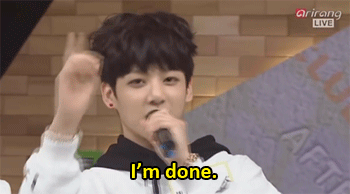
Nina is one of those movies where the main theme — a struggle to grow up — is obvious, but the rest of the elements are a mess only the writer-director could decipher. And I don’t really care. Again, I had to read Japanese postmodernists at university. What I do care about is the male form I mentioned at the start. I know I have no one but myself to blame for my expectations of how the director should have framed Luca’s body or face, but it’s one thing to frame him blandly and a completely different thing to isolate him as the only character (or actor) she’s deeply uninterested in filming competently. Everyone else in the movie gets their fair share of close-ups and decent lighting whilst Luca — whose name is literally second in the credits — gets, um, neglected.
This is his introduction:
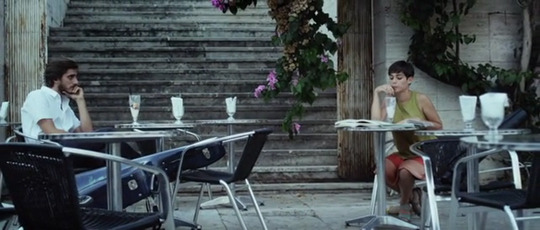
These are literally all his close-ups:
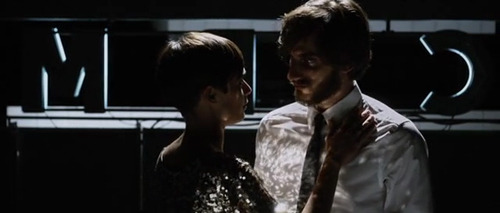
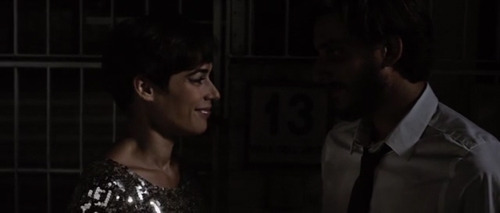
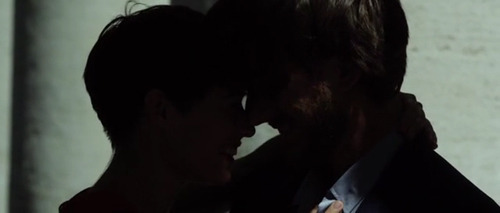
Should I even count this last one? What’s with the lighting? Like, this is as well-lit as his face gets:
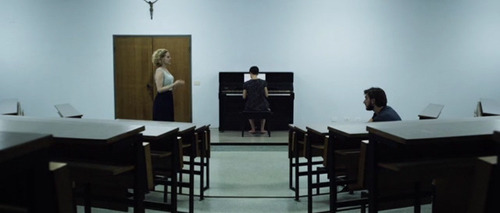
Oh, the shot is too wide and you can’t see his face properly? Well, tough poop:
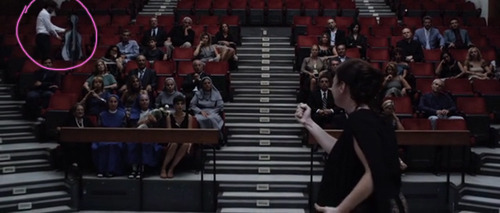
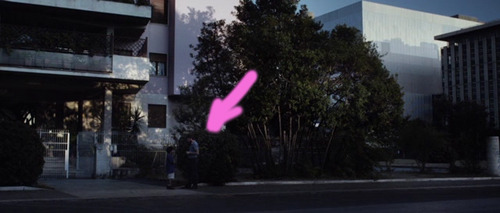
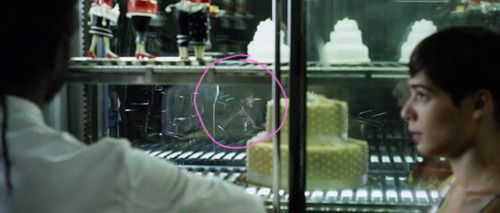
Are you kidding me with this shit?
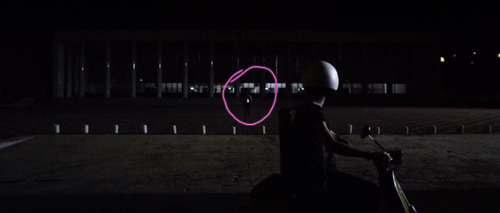
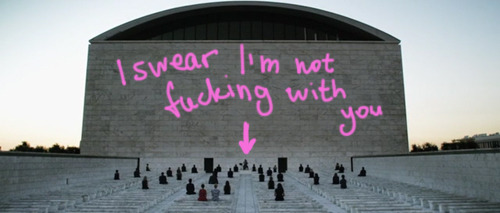
Nina may not be objectively the most terrible of the movies Luca’s been in: I’d argue both Mary of Nazareth and L’ultimo terrestre are worse, as is Slam, whose time’s a-coming. Nor is it the movie where Luca appears the least (The Great Beauty’s literal one minute of screen time is saying hi). But it’s the only movie I have no reasons to watch: it’s blandly shot, poorly structured, badly themed — and it’s actively obstructing Luca’s beauty and charisma. So no matter which film you’ll ask me to do next, at least in terms of the visual component of my posts, we have nowhere to go but up.
59 notes
·
View notes
Note
Both You and your anons have such good analysis!
Re: Showing and not telling, you’re so right! I think the short run time of episodes contributes, but so does the mockumentry style story telling. I think one of the most telling talking heads of the whole series is Ricky’s in the S1 finale once he talks to Gina for the first time that night (“maybe I changed… or maybe I’m back to who I always was”) because it’s so telling of where Ricky is at in that moment.
I think for a lot of people it’s hard to let Rina go because as of this point we have no idea how Ricky feels about anything after Gina’s confession in the flashback. In a show that doesn’t shy away from just ~telling instead of showing ~ I think that means it’ll come back up in someway? Or at the very least intentional.
It also makes me wonder how making the cameraman an actually character in S3 will change or use this!
ah why thank you! tbh i'm genuinely enjoying all this conversation from the past day or so so much right now. i've got three VERY long anons in my ask box still that i need to answer, but i want to be able to give solid answers to them, so i'm glad for these less lengthy ones to be sure.
i kind of love that i'm sorta getting both sides right now in my inbox to some extent, because i really do think there's a good dialogue to be had. i'm just acting as the messenger i suppose haha.
--
i would honestly agree about the mockumentary storytelling adding to the diegesis for the show for sure. it's more that i consider it a tool so it didn't come to mind immediately. they don't always use the talking heads to accomplish this, but they do a good bit.
--
i 100% get what you mean about finding it hard to let go when ricky's side of things just wasn't explored. and honestly, the fact they left it open-ended means that particularly with rini now entirely off the table as his endgame pretty much, they can easily decide to use it and pick it right back up again. we don’t know what it was planned to be when season 1 was taping, but on some levels, original intent doesn't even matter, because they can have it mean whatever they want it to mean, so long as it doesn't contradict anything we've seen, and it doesn't have to in this case, because nothing was said.
i know i've seen at least one person mention the idea that seeing so much of gina's side of rina in season 2 was perhaps in part to give sofia wylie more to do, because tim saw how talented she was, but again, it doesn't matter so much what they meant, so much as what they have it mean.
we don't know what ricky understood, or what he felt, because he never said anything to indicate that. so yeah- i definitely see how it's easy to take that as an open invitation to have him feel something still that can be picked back up again later. ricky had a lot on his plate last season, so i think it makes sense that gina wasn't his priority in a certain sense, but that doesn't mean she never can be necessarily.
if things go the way i've previously considered, lily's going to prime him to potentially finally be able to move on from nini in a way that matters. gina might be the person who reaps the benefits of that, even if she decidedly couldn't in season 1.
--
i think the camera man character is going to be a lot of fun tbh because of what he can add to the mockumentary aspect of this show. the actor who plays channing posted a thing on his instagram story today saying he'd just wrapped one job and now was in costume fittings for another. so my best guess, personally, is that he's going to come around for the latter portion of the show, when the camp gets closer to putting up frozen.
the potential for other people to see the content of what would normally be a talking head, or honestly more just background stuff that other characters may not otherwise catch is super cool. i'm very excited to see his inclusion and what it means!
3 notes
·
View notes
Text
Ian Martin’s Strange Paradise, Part II: The Top 5 Worst Things

Last week, I listed my top five favorite things about the first 44 episodes of Strange Paradise, when Ian Martin was headwriter and when the show had a very different feel to it than in the final four weeks of the Maljardin arc. But no creative work is perfect, and, despite my fondness for this show, I’d be lying if I said I didn’t think that the writing for early Maljardin had several glaring flaws. Unlike Danny Horn, I don’t think that Ron Sproat was a better writer than Martin (actually, I consider Sproat the worst writer on SP), but that doesn’t mean that I don’t also feel that his writing needed some improvement. Note that this entry is specifically about the writing during this period, so things outside his creative control (e.g. the Conjure Man’s questionable casting) will be excluded from the list.
That said, here are my top five least favorite things about the writing in the first nine weeks of Strange Paradise:

5. Cheesy dialogue
More specifically, (1) bad jokes and (2) slang that was already outdated when these episodes originally aired in 1969. This one is #5 because, while these lines are cheesy, I can’t hate them because most of them make me laugh. Even my personal least favorite of Jacques’ jokes, the “pose” line from Episode 18, is kind of funny in an ironic, anti-humor sort of way, like the dad jokes that have become fashionable in recent years. While there are some jokes in this show that I find genuinely funny--Elizabeth’s Song of Solomon joke, for instance, or “the lady doth detest too much”--most others are the epitome of cornball. Sometimes you hear both in the same episode: Episode 21 is loaded with Devil jokes/puns that would be unforgivably corny if Colin Fox didn’t possess enough charisma to sell them, and yet the same episode also features a genuinely hilarious double entendre. The good jokes sneak up on you, sometimes amidst a hurricane of bad ones.
As for the slang, some comments that I’ve read mention that it was largely out of date even in the late sixties. My good friend Steve (with whom I often discuss SP) has told me that “you might not be aware of how campy that slang sounded in 1969 since you obviously did not live through the Sixties--this happened with a lot of TV shows during that period, the most egregious examples being the various ‘evil druggie Hippie’ episodes of DRAGNET.” Apparently Martin became infamous for using outdated slang later on when he wrote for CBS Radio Mystery Theater, putting lines like “I dig a man who’s far-out!” and “I think bein’ around here’s gonna be kicks!” in the mouths of some of his younger characters. Even if he had used up-to-date slang, it most likely would have still aged poorly (as slang typically does), especially for generations born after phrases like “the most” and “making the ___ scene” fell out of use.
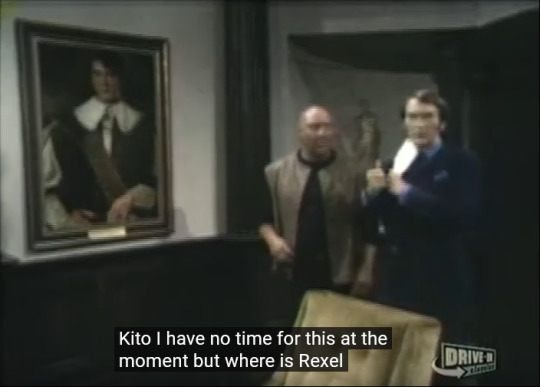
4. Slow pace and excessive repetition
This one is also low on the list, because slow pace and repetition weren’t flaws when the show originally aired, but instead have aged poorly because of advances in technology that made them unnecessary. Before the advent of the programmable VCR, you had to be able to catch the program you wanted to watch on time or have someone you knew catch it on time and record it--which, in 1969, would have meant an audio-only tape recording. This meant that only the most fortunate and/or most loyal viewers would have been able to watch Strange Paradise every day, making it necessary to recap all the major events in subsequent episodes for those who missed out. This is also likely the reason why early SP (like most soaps of the time) has a relatively slow pace: if too much happens in one episode, you have to recap more and the people who missed the big episode are more disappointed.
Nowadays, with DVRs, video streaming, and DVD sets--not to mention certain legally-questionable means--it’s nearly impossible to miss an episode of your favorite show (with few exceptions), making extensive recap largely obsolete. Screenwriters can cram as many plot points as they want into one episode and no longer have to write five episodes of the other characters reacting to the news if they don’t want to.
Even so, just because the constant recap served a function at the time doesn’t mean I have to like it. It gets annoying hearing the same plot points reiterated episode after episode. Like I said while reviewing Episode 21, “if someone were to remake this show for Netflix or another streaming service, they could safely ignore about 75 percent of the original scripts and condense the remaining 25 percent quite a bit without omitting anything important.”
And don’t even get me started on the lampshading of absent cast members, like in Episode 9 when Jean Paul and Quito wasted two minutes searching for Raxl just to slow the plot down. It’s nothing compared to Ron Sproat’s “we must search for Quito” filler episode in Desmond Hall (Episode 78), but still, those scenes were pointless.

3. Extreme artistic license with certain historical/cultural details
Although Ian Martin did a surprising amount of research on certain subjects for Strange Paradise, there are some subjects where he either didn’t do enough research, or (more likely) made extensive use of artistic license. The first one is his portrayal of Jacques’ wife Huaco as an Inca princess despite their marriage occurring over a century after the fall of the Inca Empire. I discussed this all the way back in Part II of my review of the pilot, where I invented the theory of Jacques traveling back in time to marry her, but other possible explanations include Huaco being a 17th-century descendant of Inca royalty (as the Quechua people are still alive today), extreme artistic license, and/or critical research failure. I don’t know if we would have eventually gotten a good explanation if Martin had continued writing the series, but we would need a damn good one for the approximate equivalent of having a 21st-century character marry the Russian Grand Duchess Anastasia. I’m willing to suspend my disbelief and accept it considering that this is a fantasy series, but it still creates a lot of plot holes that need to be filled.[1]
Another example of artistic license about which I feel more ambivalent is the conflation of voodoo with the Aztec-inspired indigenous religion of Maljardin, which I’ve discussed before both in my Episode 23 review and Part I of this post series. I’m not sure if this is genius--religious syncretism is a real phenomenon throughout the Caribbean and Latin America, and some people today do syncretize the vodou Serpent God with Quetzalcoatl--or just an instance of Martin playing fast and loose with facts. I would like to think it’s the former, but it could just as easily be the latter (hence why I referenced it on both lists--I have mixed feelings about it).

2. Annoying inconsistencies
Does Raxl know that Jean Paul is possessed by Jacques Eloi des Mondes? Does Vangie? Why does Jacques’ portrait disappear in some episodes after he possesses Jean Paul, but not in others? All three of these things vary from episode to episode, and change annoyingly often as the plot demands. Steve and I have also discussed this subject in the past, and he believes that Martin used this device to make the story easier to follow; if that’s the case, it appears that he used Raxl and Vangie as audience surrogates, especially for new viewers or people who didn’t tune in every day. But surely there were other ways to do that without creating continuity errors? It may have served a function, but that doesn’t make it good writing. What Martin is essentially doing is filling and reopening the same plothole, episode after episode.
Regarding the portrait, I don’t know how much to blame Martin’s scripts for this inconsistency and how much to blame the directors, as I don’t have access to any SP scripts beyond the pilot script and the Vignettes. However, I’m going to assume that he’s at least partially to blame, because at least the pilot script mentions the disappearing portrait (which literally disappears in all three of the Paperback Library novels), Also, while none of the characters ever mention the portrait vanishing (unlike in the tie-in novels), some of his episodes have characters looking at it while Jacques is controlling Jean Paul and commenting on the uncanny resemblance. See also the diegesis tag for more discussion and analysis of the disappearing portrait.
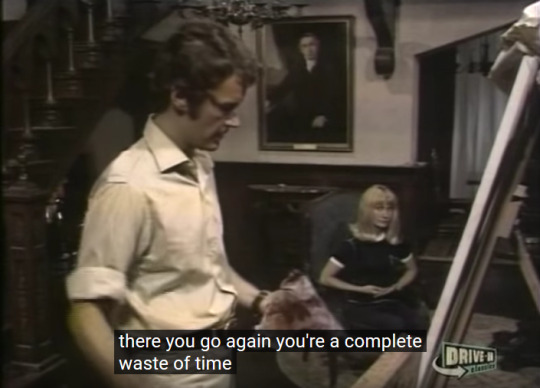
1. Tim’s subplot
It should surprise none of my regular readers that Tim’s subplot is my #1 least favorite thing about the first nine weeks of Maljardin. I’ve already written an entire post about why I dislike this subplot, so I’ll keep my discussion of it here brief. Jean Paul saves the life of artist Tim Stanton when he hires him to paint Erica’s portrait, but then does nothing to make the commission easy for him--which is not a bad set-up for a plot in and of itself, but the execution is terrible. Tim chooses to use Holly as his model despite her barely resembling Erica, and Martin mostly uses their subsequent interactions to drive the old, tired, clichéd plot where two people who bicker and hate each other at first eventually fall in love (or at least he appears to be setting that up[2]). The payoff for the Holly portrait subplot finally occurs in Episode 33, but it’s underwhelming (not to mention barely recapped) and the already bland Tim quickly becomes a background character. In short, his subplot is a boring waste of time and should have either had more payoff or--preferably--been scrapped altogether.
That concludes my list of the worst things about Ian Martin’s Strange Paradise. Stay tuned for my review of Episode 45 within the next two weeks.
{<- Previous: The Top 5 Best Things }
Note
[1] Interestingly, there is a possible (if unlikely) historical explanation for Huaco’s sister Rahua having “skin as white as goat’s milk” and “hair like ripened wheat.” An early Spanish account of the Chachapoya people (aka Cloud People) of the Northern Andes describe them as “the whitest and most handsome of all the people that I have seen, and their wives were so beautiful that because of their gentleness, many of them deserved to be the Incas’ wives and to also be taken to the Sun Temple.” Assuming the Spanish account isn’t made up, this proves that reality is sometimes unrealistic.
[2] Thankfully, given the soap opera genre, it’s unlikely that Tim and Holly would have stayed together forever, even if they had eventually fallen in love during their painting-and-bickering sessions. Even so, that doesn’t make it a good subplot.
#strange paradise#ian martin#maljardin arc#review#analysis#arc review#list#bruce gray was a good actor but tim stanton is zzzzzzzzz#even jean paul agrees ;)
2 notes
·
View notes
Text
alright, alright. Maybe I’m reading too much into things here, but from what I’ve seen before from GO, everyone involved in the show crammed so much symbolism and double-meanings into things that you’ll be hard-pressed to find something in its diegesis that wasn’t completely intentional. It’s like a little game they’re playing with us to see how much us observant fuckers can notice.
That being said, I noticed this little bit from the start of episode 2:
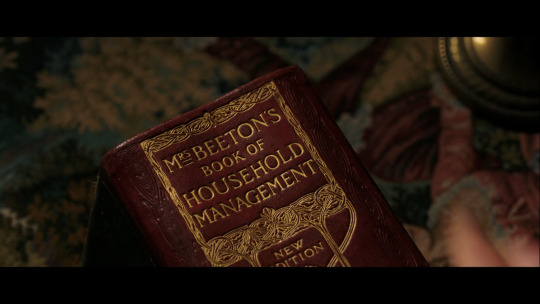
It’s the book Gabriel pretends is “pornography! :)” in order to speak to Aziraphale alone during his shop hours, and he sets it down hard on a side table, but for some reason, they chose to put it in-frame. They didn’t have to do that, there was no reason to have a separate, 2-second shot just of Gabriel slamming down a book, especially when the title is in-focus, and nothing else is (I forgot my technical film terms for that kind of focus, and I’m not digging out and rifling through my study flash cards for a tumblr post lol). Maybe aesthetics? It would go nicely with the general theme of the show, but it’s still extra work, at the end of the day. I mean, unless you wanted audiences to notice it
Aaaaaand here I go into a hyperfocused rampage down wikipedia
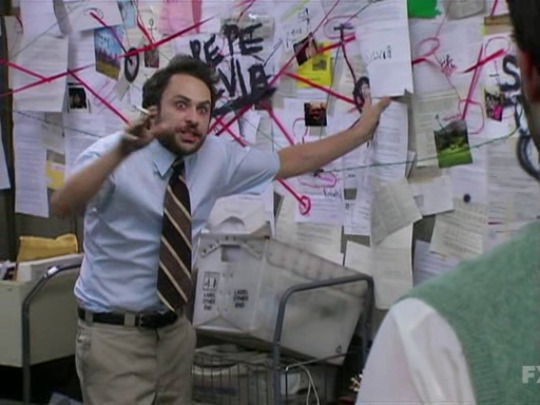
Let’s start with some canonical facts, some of which I yoinked from the novel:
-Aziraphale is a bibliophile of biblical (lmao) terms. If you subscribe to the theory that he’s on the autism spectrum, you could reasonably say that books are one of his hyperfixations/special interest.
-He also loves food. To the point where you could say that food’s one of them, too.
-However, Aziraphale has a clear preference to first edition books. He collects first editions in particular, and a great many of which are signed by their authors and addressed to him. His bookshop is advertised as selling first editions, but if anyone actually tries to buy them off of him, he will not hesitate to pull every ounce of angelic magic in his being out to keep them away from his precious dust catchers. C’mon, he has special reading gloves to make sure he doesn’t mess up the pages. Like smeogol with the one ring, this bastard angel. So why is it a new edition (which was the third edition published, of I’d estimate about 50 from the size of that list, that currently exist today), and not a first?
It’s not like Aziraphale wouldn’t have been around at the time. The guy’s immortal, he’s been on Earth since the literal Beginning. And it’s established in the episode 3 cold open that he was in England when that book was first published (1861), so it’s not like he was tied up somewhere else. He was in the area, he was already running his bookshop for a decade or two short of a century by that point (if the dialogue from the Reign of Terror scene is to be believed), and I can’t imagine that he didn’t have the means to get it, being able to perform miracles at will, and all that. Maybe it got popular later? Nah, apparently it had already taken London by storm and sold millions of copies before the author died in 1865. Would have been a hot ticket item for a man like Aziraphale, hm?
Which is why I gotta bring it back to his fixation with food.
We always see him at some kind of restaurant, and it’s established in episode 1 that he regulars some of them enough that they not only know him by name, but also an assortment of his favourite things to order from them. I mean, how much does this boy eat out? JFC, Aziraphale (but me too if I could afford to)
Apparently, only around 20 pages of this book were dedicated to keeping a house, and the rest were tried and true recipes and a discussion about cooking; over 900 pages worth of them. My main man Aziraphale’s out here expanding his culinary horizons even more than he already has. So why not a first edition cook book?
Well, the first edition was stuffed full of a whole lot of bullshit. If google’s to be believed, she recommended boiling pasta for an hour and forty-five minutes, said mangoes tasted like turpentine, that garlic was offensive, potatoes were “suspicious,” (hey mrs. beeton what the FUCK does that mean) cheese could only be consumed by sedentary people, and she couldn’t even take a side on tomatoes. One minute, they were the best things ever, and the next, they’re actual hellspawn. She also didn’t like branching out into unfamiliar dishes, and it was very much written from the nobility’s perspective, so lower classes didn’t find it as accessible. Later editions heavily edited all of that out and replaced it with actual useful information. The first edition is very much not something Aziraphale would be pleased with, so he’s gotta reconcile his unquenchable desire for first editions with his love of food.
And in the end, it seems practicality won out. This wasn’t a purchase for his collection, that was something for him, despite it going against our previous image of him. And maybe putting that in frame with “new edition” clearly visible was meant to show how Aziraphale isn’t as stubborn and stuck in his ways as we’ve been led to believe up to this point in the story, and the change in him jst depends on where the pull is coming from. Hence, Crowley vs. Gabriel.
Briefly tying into that, the immediate next thing that happens is Sandelphon saying that something smells evil, and in a moment of panic, Aziraphale blurts out “oh, that’ll be the Jeffrey Archer books, I’m afraid!” and like, okay. Yeah, that was probably for comedic intent over anything else, since GO’s also a comedy by genre, but that’s still quite a niche joke even by British comedy standards, dependent on a working knowledge of British politicians-turned-novelists. Aziraphale’s supposed to be an angel; an agent of total, infallible good, isn’t he? Why would he even know that Jeffrey Archer also writes books that would in turn be a suitable and believable placeholder for “yeah, my demon boyfriend best friend hangs out here enough for it to faintly smell like a demon” if he hadn’t, at some point, perused those books himself?
Or maybe I’m reading WAY too into things, it meant nothing, and it was just for the “oh the old bookseller sells old books!” effect of it all. Then again, Neil Gaiman did confirm that the piano in the last shot with them was supposed to mimick Aziraphale’s wing shielding Crowley from the rain in the Garden of Eden, so this show does have a tendency to go a lot deeper than the surface level. I don’t know, it’s still more fun to deconstruct things regardless of original intent, IMO.
#aw geez this turned out too long#good omens#aziraphale#crowley#gabriel#anthony j crowley#film analysis#shut up dames
63 notes
·
View notes
Note
I dislike very much this idea that Kylo isn't Ben. Like, I find that a little cowardly to think that as if Ben did nothing wrong in hislife and that it's the perfect solution to have an happy ending and bla bla bla... Symbolic is okay but there is also the diegesis of the film and sorry but Kylo and Ben are the same perso... and if Rey can loves Ben but not Kylo I'm like "???" I mean, his crime will not be erased like this? Just by changing a name?

What can I say, I don't like it either, though I'm becoming more and more certain it is what we'll unfortunately get. A century of psychoanalytical approach to culture gets thrown down the garbage chute by a bunch of not very reflexive babies, if I can allow myself this ventingly over the top language.
I think the abstract essence of the problem is that mythical storytelling is symbolic and symbols are ambiguous by definition. The moment you try to conceptualize them, they lose all meaning, especially when it comes to the heavily morally weighted shadow symbolism, which I don't think anyone would suggest Anakin/Vader or Ben/Kylo dichotomies are not. Paradoxical, oxymoronic symbols (like cross - death and resurrection, snake - fall and rebirth or essentially yin yang) are to be contemplated, not conceptualized.
Which I feel is what DLF are doing with the dichotomy of human nature George Lucas depicted. You want to see Vader's redemption as Anakin becoming himself again, fine, but it's also about Luke recognizing his own shadow and internalizing it. It's worth noting that Vaderkin isn't called by either of his names in the last part of RotJ - Luke only calls him father. So yes, it's not very complex but it's not overconceptialized.
With Ben/Kylo... dlf not only conceptualize the dichotomy but bottle it in a coca cola bottle and sell by millions. And to top it all off, make what they keep calling mythical story telling as explicit as they can in terms of violence depiction. I know a lot of people, when told thag a straightforward redemption makes little storytelling sense now, respond with but this is how star wars do it and they're probably right but what works in a novel, comic or even animation won't necessarily work in live action.
But what amuses/depresses me most is that the people who insist it's all about Ben getting redeemed before Rey accepts him keep thinking that this makes sense in Rey's story. It does make sense - in Ben's individuation but not in Rey's. Are we really going to pretend that jumping down the porg hole and crying offscreen is sufficient confrontation with the shadow for a myth now?
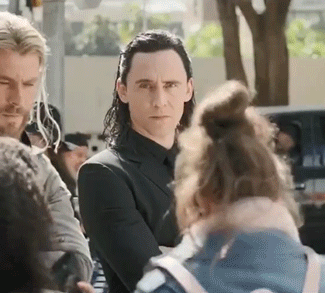
53 notes
·
View notes
Text
#879: ‘Masculin Féminin’, dir. Jean-Luc Godard, 1966.
This post might as well be subtitled ‘Exactly 7 Facts about Films that Might Be Doing Something or Might Not’.
Jean-Luc Godard’s Masculin Féminin begins with its title displayed, one word at a time, accompanied by the sound of gunshots that seem to be taken from a sound-effects catalogue. Immediately afterwards, we see Paul (Jean-Pierre Léaud) writing the most banal of political poetics in his journal, and reading them aloud as he does so - not in voiceover, but there in the diegesis. As in many Godard films, this budding young radical strikes up a conversation with a young woman, Madeleine (Chantal Goya), who seems to have very little interest in him. As the conversation dwindles, an argument abruptly breaks out between a man and a woman, and the woman shoots the man to death. This fact will not be commented on again by either of these protagonists for the next ninety minutes.
This is how the film operates; moving from ineffectuality to absurdity. ‘HUMAN LABOUR RESURRECTS THINGS FROM THE DEAD’ takes over the screen. In the first half of the film there are two shootings, a self-stabbing and a self-immolation (only the stabbing is seen on screen). It’s clear from early on that Godard doesn’t seem to have much respect for Paul and Madeleine as characters, or indeed any of the young people in the film - all the young women are vapid and only come alive when they regard themselves in the mirror. In the second scene of the film, Paul announces that putting yourself in another’s shoes is pointless, but signs an open letter complaining about the treatment of writers in Rio de Janeiro. The men in the film loudly and overtly discuss the breasts of the women around them - Paul tells Madeleine “I like the kind of breasts you have” as though it’s a wonderful compliment. So what’s the point in this film, aside from being a time capsule of various stuff, either mundane or obnoxious?
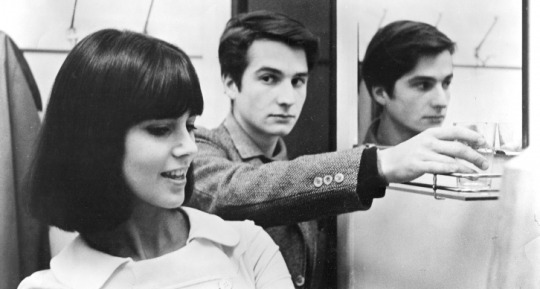
The best clue might come in the form of another intertitle, one of the ‘facts’ that Godard shares: ‘Philospher and filmmaker share a way of being, an outlook on life that embodies a generation.’ Godard seems to want to do some sort of ethnographic kind of film - a thinly fictionalised version of a documentary. It’s never quite clear, though, if Godard has utter contempt for the types of youth he’s making the film about (which is why all the boys are wannabe radicals and all the girls are vapid), or if he’s trying to be sympathetic towards them and wants to chronicle the awkwardness of the society they find themselves in (hence the random violence and the frequent haunting by the ghosts of Vietnam).
Either way, Godard sees most of these youths’ experiences as empty. The relationships in this film are gangly and ineffective, as Robert is in love with Catherine, who is in love with Paul, who is in love with Madeleine, who returns his affections far less often than she does Elisabeth’s. There are few conversations between the characters, only interrogations and political tracts. Godard even made most of these competing monologues in the editing suite, intermixed so that separate monologues seem to be happening in tandem. Paul changes jobs frequently, seemingly so that he can interrogate people in different contexts as Godard sees fit.
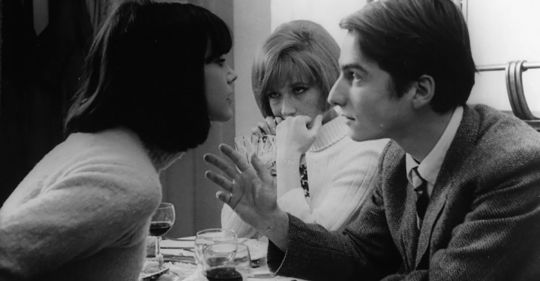
The worst problem with Masculin Féminin is that because it’s more disjointed than most French New Wave films, because it lacks even the most basic of narrative closures, it’s often deathly dull while also being difficult to take seriously. Godard is such a lion of the movement that it’s often easy to ignore that he didn’t seem to put a lot of thought into his films in advance. It feels a bit hostile to say that he’s coasted on his early recognition, but it’s a hard conclusion to avoid when confronted with Masculin Féminin. Breathless, Alphaville and Contempt are all strong films, but they hide their problems well. Godard here makes no attempt to conceal the weaknesses of the plot, the sloppy sound editing, and the randomness of the violence that is somehow even more confusing for its absence in the second half. I never thought I’d say it, but I missed the random shootings when they stopped.
This is the curse for viewers of Godard’s films, as well as the viewers of several other directors - all men, all (distressingly) auteurs. But it’s also a boon for the directors themselves: the ability to mine that ambiguity between saying something and merely appearing to. Is the director making a set of good insightful points about the failings of youth? Is he arguing that these ‘failings’ are virtues? Is he implying that the failings are unavoidable because of society, or does he view his work as complicit (as one of his final intertitles suggests)? There’s no way of telling, or even being able to clearly rank these possibilities in order of likeliness, and so Godard can have all the cakes and eat them too.
Once this becomes obvious, we can look past it to what is left without this ambiguity: a dull, haphazard film that pushes the boundaries of narrative filmmaking without any clear intentions. One of the scenes midway through shows two characters playing with a toy guillotine - a instrument of oppression turned into a capitalist plaything. Watching the characters fumble with the little contraption feels right, somehow. It adds nothing to the plot while arguably being thematic in all different ways. It’s another ambiguity.
It’s another cake for Godard to eat. And that might actually be terrible.
18 notes
·
View notes
Text
chicago (2002)
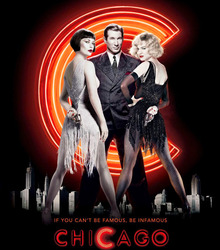
chicago is the story of two murderesses (velma kelly and roxie hart) set in 20s chicago (duh). it’s a musical so bye everyone who just checked out!! the songs are sexy, smoky vintage jazz and the cast BANGS (auntie tanya from mamma mia anyone?) it’s funny and showy and bursting at the seams with glamour but most importantly it doesn’t take itself too seriously. also catherine zeta-jones got an oscar for this movie so if that doesn’t sell it to you i honestly don’t know what will
allow me to preface this review by saying: if you haven’t seen chicago yet, get in the bin
seriously go watch chicago
it will make you want to kill a man with a stiletto whilst dragging on a cigarette
okay now that we’ve got that out of the way, chicago:
can we PLEASE talk about how hot catherine zeta-jones is?? even with THAT haircut. she is the only person on god’s green earth who can pull that off

DOMINIC WEST I LOVE YOU AND YOU ARE PAINFULLY UNDER-UTILISED IN EVERYTHING (also in my head he is andrew scott’s husband and nothing can unravel that connection) (also side note could he not be dominic cooper’s dad. like they have the same face. and name. sorry distracted)
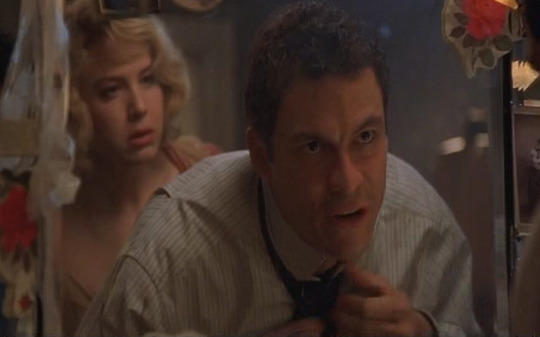

ahh. renee Zellweger. she’s cool! she’s fine! she’s bridget jones! she just…….. has a very tense face. are we meant to be rooting for her in this? because roxie is low-key a bitch.
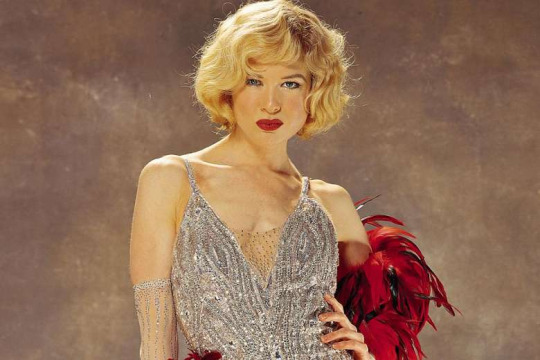
‘and all that jazz’ is SUCH a banger. and is interestingly one of the two diegetic songs in the film (idk if we count ‘but I can’t do it alone’)
on that note, let’s talk about the film’s use of diegetic music! lindsay ellis did a really interesting video on diegesis in film so check that out for a MUCH better explanation but essentially, diegesis is anything that happens within the premise of the film (i.e. ‘and all that jazz’ actually is sung by velma kelly in the film at the club). on the other hand, non-diegetic music is any music that does not actually happen within the confines of the story. this is the default for music in film – most soundtracks are non-diegetic as there usually isn’t ACTUALLY a 50 piece orchestra sitting camera right (sorry, titanic).
chicago uses the theory of diegesis pretty uniquely, as most musicals do operate on a non-diegetic system (the musical numbers are usually metaphorical and don’t tend to require explanation within the film). by contrast, chicago does provide an explanation for the non-diegetic musical numbers: they’re happening in the protagonist’s head as her way of coping. this really WORKS because it not only makes the film both stand out and make more sense, but also adds another layer to roxie’s character and reaffirms her obsession and dreams of stardom. go movie.
john c. reilly is that dude that has been in every film under the sun and you still have no idea what his name is
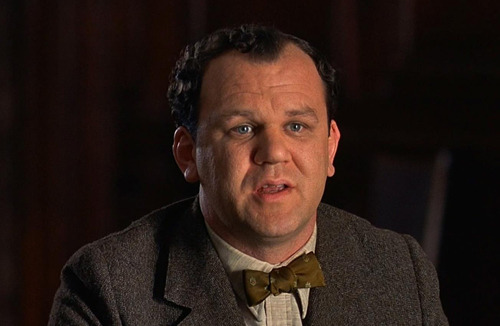
okay let’s address the elephant in the room:
the SINGING
catherine is killing the damn game holy calzone triple threat who???? hot damn

renee zellweger! okay i see you girl! doing The Most™! we get it calm down you’ll pop a damn vein
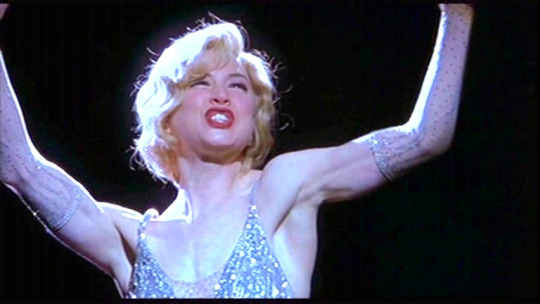
queen Latifah could push me into a volcano chanting ancient cult hymns and I’d climb out again just to hear her finish that woman has a VOICE (also how gorgeous my lord she just glows)
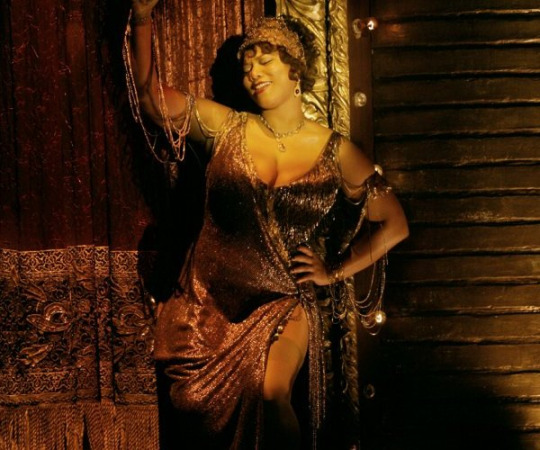
richard gere is a sexy, sexy man. i don’t care what you say about his singing i’ll just stare at his face and pretend i can’t hear
who else sings um
oooh the CELL BLOCK TANGO
okay but like?? none of those characters ever come back again?
byeeeee
also 5 of them literally caught their husbands cheating or whatever and the first lady shot him twice for CHEWING GUM
like i get it’s annoying but overkill?
anyway I think between chicago and moulin rouge we’ve proved that every good movie needs a tango (honestly could have saved tlj don’t @ me :) rian johnson u listening?)
in ‘all I care about is love’ how does he get those boxers off in one swipe?? get u a man like that
remind me why billy took the case for less than half his asking price? what changed his mind?
i love the aesthetic of this film but i feel like they really could have pushed it further and made it sexier and smokier and glitzier soz
that LUCY LIU cameo yum

czj’s accent omfg she’s WELSH GUYS she’s actually magic
i actually really liked how every set looked like a set (let’s face it the prison looked as real as a £3 note) – it really tied in to the whole performance and entertainment and just general SHOW vibes of the film. good job
roxie u SNEAKY BINCH with that pregnancy story
‘we both reached for the gun’ is high key super creepy (giant puppeteer richard gere anyone) but such a cool concept
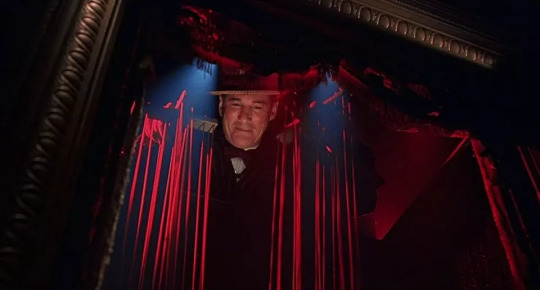
ohh that was a BOOB GRAB
RICHARD NO
... richard yes?
you know what’s sad? this film was nominated for thirteen oscars in 2002. it won six. including best picture. and you just KNOW that it wouldn’t even win like…… hair and makeup now. why do pictures have to be arty and subtle to win oscars?? like i get indies are often better quality and more original but you can still get amazing big budget studio movies. just a thought.
the closing number is an absolutely perfect ending for this film – it’s satisfying and slick and cut throat
anyway chicago is an absolute riot and makes for super fun viewing so I’m giving it:
8/10
(it was well made, good acting, fun story and just an absolute blast to watch and listen to!! loses points for not giving dominic west enough to do (your problem not mine) and for roxie being just the most annoying goddamn ‘’’’’protagonist’’’’’ ever)
SPOILERS (it won’t let me put two cuts ffs tumblr what are u doing)
can we please talk about the seismic tonal shift that was the execution of the innocent hungarian lady? it was an incredible sequence but felt really out of place and i wasn’t 100% sure why it stayed in? i guess it was to strike fear into the audience that that could happen to roxie buuuuuut…… let’s be real we couldn’t give a flying MONKEY’S about what happens to roxie (to quote demi: sorry not sorry)
#chicago#renee zellweger#catherine zeta jones#john c reilly#richard gere#dominic west#film review#long post#musical#chicago (2002)#dance#2002#movie#film#critic
22 notes
·
View notes
Note
Dearest and fairest of potions making Patchy♡ I would like to have a Bottle of Diegesis of you will. Could the bottle be split into two vials? I like to give it to my two beloveds Shinsou and Shoto♡
If they could be made in Gold vials and the potion in the color of Lavender ♡
(A dream date is going to a botanical garden, I really love to spend most of the day just looking and learning about so many plants and the chance to see the cute little bug friends or walk around a museum and after get ice cream♡)
Love you and thank you so much beautiful ♡♡♡
Dearest Mar, thank you so very much for wanting to join me at this celebration, and for being such a sweet and good friend to me. Your presence is always a joy and I appreciate all that you do and give. If I could, I would give you the world and all the sweet things within it. But hopefully, for now, this is good enough 💛
Now please, sit and get comfortable. I have a potion to brew for you.🔮

“Butterfly exhibit is this way.”
You felt Shouto’s cold hand begin to tug you gently in the direction where the special, limited-access, exhibit was being hosted within the Nature Museum you were currently strolling in; a gentle smile formed as he looked down at your sweet face. You couldn’t even make it a full step before your hand was grabbed again, tugging you back as you stumbled ungraciously into a sturdy chest
“Yeah, but the night-blooming flowers are being shown this way” Shinsou’s calm voice immediately calmed you down as your tense shoulder’s relaxed as you let out a sigh of relief.
“Maybe so, but she wanted to see the butterflies. Didn’t you, my love?” Shouto countered, gently tugging you once more back onto your feet and towards him; hand brushing your cheek as he cooed down at you.
“Yes, she did.” Shinsou agreed, though his grip was still tight enough to stop Shouto from running away with you “But she also said she wanted to see the Moonflowers.”
“We can see both” You interrupted, voice soft as to try and stop any scene that may unfold “We can see the moonflowers first, then the butterflies because they’ll lead to the rest of the museum, okay?”
You beamed happily at the nods of approval, feeling their grips on your hands slacken as they allowed you to take the lead and drag them off to where you wanted to go.
After all, it was your day of spoiling; an idea proposed by both of them a week ago after they noticed your excitement when you read a news article about the special ‘spring-themed’ exhibits that were coming to the city - and how could they even think of not going when they say your eyes sparkle as you read to them what was going to be there?
Though, they seemed to have a problem with sharing when it came to you on a date. Not that they hated the idea, not at all, they wouldn’t be in the arrangement if they hadn’t. It was just…. you were too precious and they couldn’t help but want to be the reason you smile - this was, after all, the third little spat you had to break up since arriving. But, you couldn’t help but feel special over the attention, you always did.
“And after, we can go for ice cream!” You exclaimed, tugging them along even faster as you saw the “Night-Flower’ exhibit sign.
“Sounds like a good idea to me” and “A perfect way to end the day” they both mumbled out with adoration in their eyes as they watched you being authentically you.

A potion for a potion, I hope this pleases you 🔮
#i feel like this isn't the best#and i apologize for that#but I still hope you like it#and believe me#they will spoil you rotten and let you drag them around all day without complaints#thank you again for always being such a sweet friend#you truly deserve the world💛#🔮.the peddler answers#🔮.fellow witch mar#🔮.a peculiar 600 follower event
3 notes
·
View notes
Note
Hey Camille, I hope you're having a good day :) I have a question for you and I really don't want to offend you with this, but do you think you could explain to me why you ship Rory and Jess? I really don't mean this offensive in any way, I'm just curious because I just rewatched GG and I could never really understand everyones fascination with these two. I just never felt chemistry or liked Jess much as a character. Again, sorry if this comes off the wrong way, I'm just genuinely curious! xxxxx
Okay so this is probably gonna be disorganized. First you need to know I never fall for the bad boy type. But I don’t see Jess as the bad boy actually. He is a complex character. He’s a nerd, a literati, a broken guy, a sensible person, but also a very insecure kid. I think people don’t ship them because they don’t see Jess like something outside the hoodlum or the bad boy. You need to understand the character, why he acted like that, what is his story outside the diegesis. I like the fact Jess helped Rory to open her eyes about the world. He was a broken person, he isn’t optimistic like Rory. He came to the right moment in Rory’s life. She needed that for mature, she needed that before leaving Stars Hollow. She also needed to take risks, to go outside her comfort zone. But Jess was also able to understand Rory and to not let her go too far away from her personality. But why I really love Literati it’s because it’s a two sides love story. Rory learned with Jess but also Jess learned a lot with Rory. I don’t give them credit for each other success. But I do think they both helped each other. For example, Jess didn’t need Rory to write a book and find a good job, but he did need Rory to let him think he was able to be someone, to be loved… Also Jess has this place between Rory’s worlds (Stars Hollow/ “Upper World”) he can fit in both. Unlike Dean and Logan. He ultimately is the best fit for Rory.
#gilmore girls#literati#rory x jess#so sorry for my english#I wrote this quickly after bed#and I probably forgot a lot of reasons#and don't worry I don't take your ask in the wrong way#it's a good question#ask#ask camille#Anonymous
18 notes
·
View notes
Note
002 | Lighting/Doc, Lightning/Francesco, or Lightning/Storm?
Oh man, giving me the challenging stuff! I don’t ship any of these, but in the spirit of the meme I wanted to try really hard to envision these scenarios. This ended up being really fun, so thanks anon!
Just a note, though: I’m going to put Doc/Lightning in a separate post and under a Read More, so people who are squicked by things that border on parent/child can scroll past it more easily.
Lightning/Francesco
when or if I started shipping it. Lightning/Francesco? I don’t. XD
my thoughts: They feed off each other’s energy. In public it’s mostly barbs and sass, and the folk around them kinda get it; like it’s good fun, they’ve got a good rapport. But they also have really deep, borderline metaphysical conversations with each other. Not Fillmore-metaphysical, but like–their purpose in the universe, the nature of camaraderie and the human condition (car condition, whatever). And Diegesis, because of course Francesco is a good Catholic. It’s never for long, and always ends on an energetic uptick, but it’s part of the song and it’s the combination of these aspects that makes their relationship such a virtuoso performance.
What makes me happy about them: KA-CIAO
What makes me sad about them: They race on completely different circuits on completely different continents, so they don’t get to see each other much.
Things done in fanfic that annoys me: N/A
Things I look for in fanfic: N/A
My kinks: Since they’re both racers but are such completely different cars in all possible mechanical senses, they’re actually really interested in/attuned to how the other works and moves. Learning how to drive together is just as much a new language as Lightning’s endearingly horrible Italian. They’re better at the driving thing.
Who I’d be comfortable them ending up with, if not each other: Sallyyyyyy
My happily ever after for them: Spending Christmas eve together and taking Momma Bernoulli to evening mass.
Lightning/Storm
when or if I started shipping it. Lightning/Storm? Don’t ship that, either!
my thoughts: What’s so interesting about them together is that it always feels like there’s a third car in the room–this psychic amalgamation of all the things they’re projecting onto each other. Neither of them are the sort to be intimidated by the competition–but they both put each other on the defensive. Lightning because of the part of him that’s deeply self-conscious about his potential inadequacy in light of the paradigm shift Storm represents–a part he’s not quite in touch with, and doesn’t really want to be. Storm, because the racing world freaking loves this guy. LOVES him. And Lightning moves through the world in a way that makes it clear that he assumes cars will like him, and he will like them, and it drives Storm insane because what world is that. WHAT WORLD IS THAT. So whenever they interact, there’s all this added friction and heat between them, like tinder.
What makes me happy about them: When tossed into inopportune situations together, they have this hackneyed teamwork that’s totally goofy, because they’re maladapted in a lot of the same ways–no matter how much more mature Lightning insists he is, and no matter how much edgier Storm thinks he is. XD
What makes me sad about them: They don’t realize this, but a lot of what they find so attractive about their relationship is based on the high emotion of all their self-conscious anxieties. So they feed these things instead of trying to work on them. Which keeps the fires of attraction high but only makes them more dysfunctional in the long run.
Things done in fanfic that annoys me: N/A
Things I look for in fanfic: Lightning and Storm both having things to work on, and not just Storm (even though Storm has more obvious work to do; I’m just not into the power dynamic where only one person is learning and the other person is perfect)
My kinks: outsider POVs on the pressure front that moves in and palpable changes the atmosphere of a room any time Storm and Lightning are in proximity.
Who I’d be comfortable them ending up with, if not each other: You know, my default answer for Lightning would be Sally, but in the AU where this relationship takes place, I actually don’t think Lightning and Sally would be right for each other. Not coming out of this relationship with Storm, in any case.
My happily ever after for them: That might be a shade more than they can hope for. But I do very much wish them well.
#cars headcanon#cars 2#cars 3#lightning/storm#lightning/francesco#lightning mcqueen#jackson storm#francesco bernoulli#boy howdy am i through the looking glass now
25 notes
·
View notes